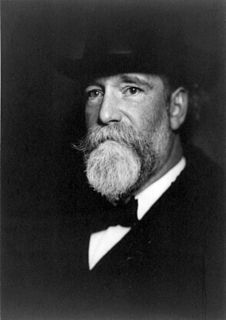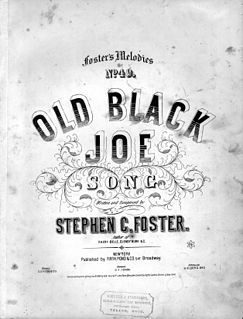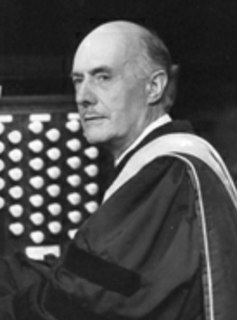Related Research Articles

Louis Victor Jules Vierne was a French organist and composer. As the organist of Notre-Dame de Paris from 1900 until his death, he focused on organ music, including six organ symphonies and a Messe solennelle for choir and two organs. He toured Europe and the United States as a concert organist. His students included Nadia Boulanger and Maurice Duruflé.

Douglas Stuart Moore was an American composer, songwriter, organist, pianist, conductor, educator, actor, and author. A composer who mainly wrote works with an American subject, his music is generally characterized by lyricism in a popular or conservative style which generally eschewed the more experimental progressive trends of musical modernism. Composer Virgil Thomson described Moore as a neoromantic composer who was influenced by American folk music. While several of his works enjoyed popularity during his lifetime, only his folk opera The Ballad of Baby Doe (1956) has remained well known into the 21st century.

Horatio William Parker was an American composer, organist and teacher. He was a central figure in musical life in New Haven, Connecticut in the late 19th century, and is best remembered as the undergraduate teacher of Charles Ives while the composer attended Yale University.

Hiram Clarence Eddy was a United States organist and composer

Félix-Alexandre Guilmant was a French organist and composer. He was the organist of La Trinité from 1871 until 1901. A noted pedagogue, performer, and improviser, Guilmant helped found the Schola Cantorum de Paris. He was appointed as Professor of Organ at the Paris Conservatoire in 1896.

"Old Black Joe" is a parlor song by Stephen Foster (1826–1864). It was published by Firth, Pond & Co. of New York in 1860. Ken Emerson, author of the book Doo-Dah! (1998), indicates that Foster's fictional Joe was inspired by a servant in the home of Foster's father-in-law, Dr. McDowell of Pittsburgh. The song is not written in dialect.
Edward Shippen Barnes was an American organist.
Seth Daniels Bingham was an American organist and prolific composer.
Roosevelt Organ Works was an American manufacturer of pipe organs. It was founded by Hilborne Roosevelt (1849–1886) and his younger brother, Frank Roosevelt (1862–1895), in 1872. It operated in New York City, with branches in Baltimore and Philadelphia. The brothers built some of the largest organs in the United States during their career, and many today are still prized for their quality and tone. The company was in operation until 1893.
Gordon Balch Nevin was an American composer and organist. A member of the Nevin musical family of Edgeworth, PA., his cousins were the composers Ethelbert and Arthur Nevin, and he was the son of composer and businessman George Balch Nevin. The Balch Family is one of the Colonial and Revolutionary Families of Pennsylvania.
Arthur Eaglefield Hull was an English music critic, writer, composer and organist. He was the founder of the British Music Society.

Roberta Bitgood (Wiersma) was an American organist, choir director, and composer. She was a pioneer of 20th-century American church music, and the first woman to serve as national president of the American Guild of Organists.

Alfrēds Bruno Jānis Kalniņš was a Latvian composer, organist, pedagogue, music critic and conductor; the founder of national Latvian opera. Kalniņš is primarily remembered for his national opera Baņuta (1920).

Colin McAlpin was an English composer of songs, operas and ballet music, an organist and a writer of critical essays on music.
Filippo Capocci was an Italian organist and composer.

James Hotchkiss Rogers was an American organist, composer, teacher, music critic, and publisher.

Vincent O'Brien, Irish organist, music teacher and composer. O'Brien was an important figure in early 20th-century Irish music. For some, he is mainly known as the first teacher of singers such as John McCormack, Margaret Burke-Sheridan and the writer James Joyce.

Clarence Dickinson was an American composer and organist.
Karl Merz was an American composer, author, editor, and arranger of German descent.

Charles Henry Galloway was a St. Louis, Missouri church and concert organist, choral conductor, educator, and composer.
References
- 1 2 3 4 5 Bachrach (April 14, 1951). "Dr. H.V. Milligan, Noted Organist, 67". The New York Times . ProQuest 112004026.
- ↑ http://www.oxfordmusiconline.com/?q=%22Stephen+Foster%22&search=quick&pos=1&_start=1#firsthit%5B%5D%5B%5D
- ↑ Wischusen, Mary A. (2010). "Milligan, Harold Vincent". Grove Music Online (8th ed.). Oxford University Press. doi:10.1093/gmo/9781561592630.article.A2088095.
- ↑ Harold Vincent, 1888–1951 Stephen Collins Foster : a biography of America's folk-song composer / by Harold Vincent Milligan
- ↑ Milligan, Harold Vincent (May 22, 1935). "Radio: Women's Radio Committee Clarifies". Variety. 118 (10): 36. ProQuest 1475919574.
